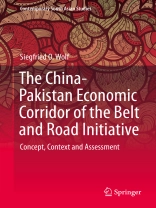This book focuses on the implementation of the China-Pakistan Economic Corridor (CPEC), a multi-billion-dollar infrastructure development project intended to connect Asia with Europe, the Middle East and Africa. By introducing a new analytical approach to the study of economic corridors, it gauges the anticipated economic and geopolitical impacts on the region and discusses whether the CPEC will serve as a pioneer project for future regional cooperation between and integration of sub-national regions such as Balochistan, Khyber Pakhtunkhwa, the Federally Administered Tribal Areas, and Gilgit-Baltistan. Further, it explores the interests, expectations and policy approaches of both Chinese and Pakistani local and central governments with regard to the CPEC’s implementation. Given its scope, the book will appeal to regional and spatial sciences scholars, as well as social scientists interested in the regional impacts of economic corridors. It also offers valuable information for policymakers in countries participating in the Belt-and-Road Initiative or other Chinese-supported development projects.
Table of Content
Introduction.- The Conceptual Framework Regarding Economic Corridors.- Chinese Motivations.- Pakistani Motivations.- Challenges Towards the Implementation and Functioning of CPEC.- Assessment.- The GSP+ Conundrum and CPEC’s Impact on EU-Pakistan Economic and Trade Relations.- Afghanistan within the BRI Vision and the Feasibility of Enlarging the CPEC.- Development versus Democracy? The CPEC and Civil-Military Relations in Pakistan.- Final Thoughts.
About the author
Dr. Siegfried O. Wolf is Director of Research at the South Asia Democratic Forum (SADF), a Brussels-based think tank, and a Senior Researcher (member) at the South Asia Institute, Heidelberg University, Germany. He completed his Master of Arts (2003) and Doctor of Philosophy (2009) in South Asian Political Science at Heidelberg University. He is an affiliated researcher with the Pakistan Security Research Unit (PSRU, Durham University, UK), a former research fellow at the Institute of Political Science (IPW, Heidelberg University) and Centre de Sciences Humaines (CSH, New Delhi, India), and a former visiting fellow at the National University of Science and Technology (NUST, Islamabad, Pakistan). He was a member of the external expert group for the Afghanistan-Pakistan Task Force, German Federal Foreign Office, and worked as a consultant to the Federal Ministry for Economic Cooperation and Development (BMZ), Germany.












